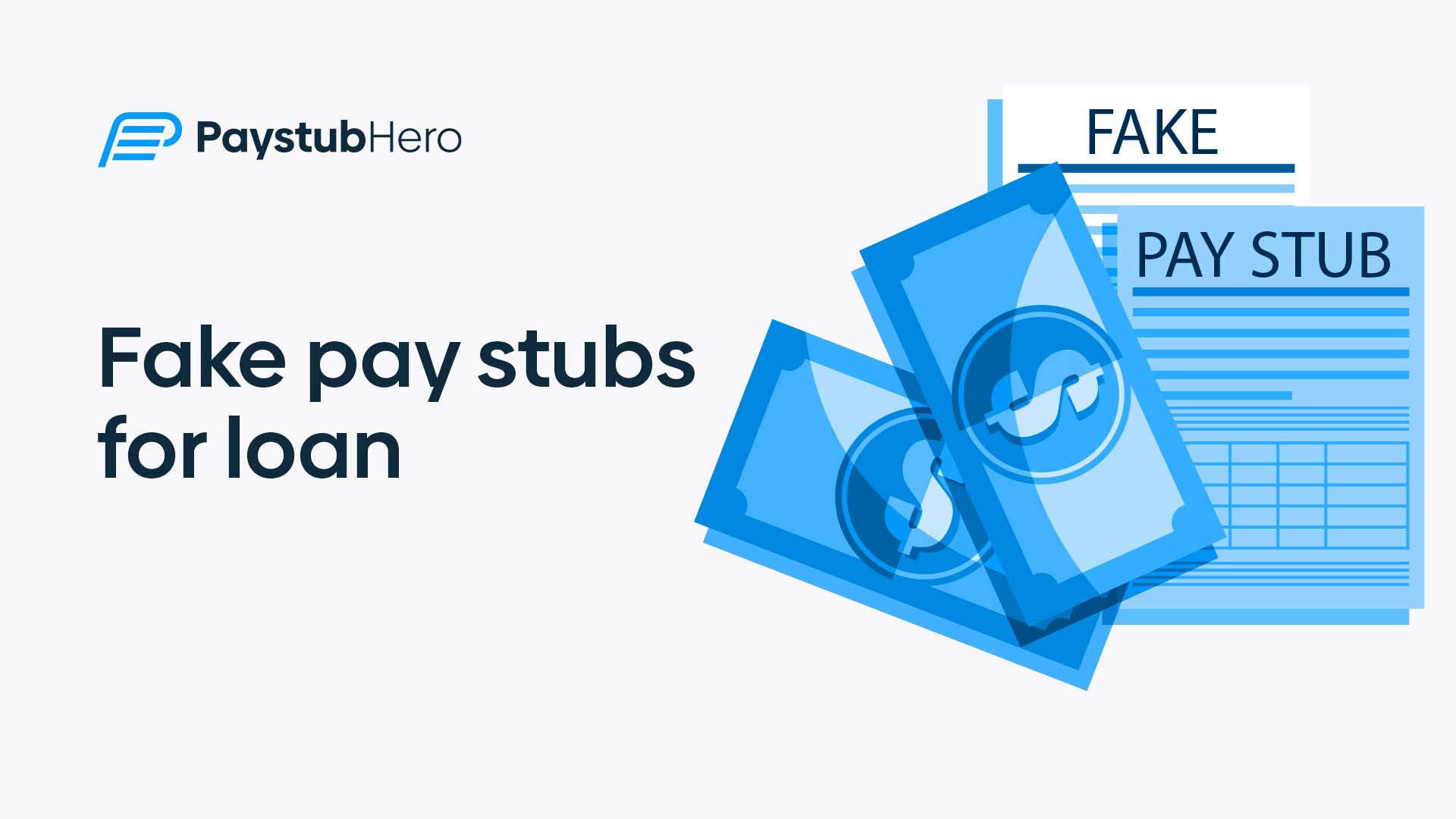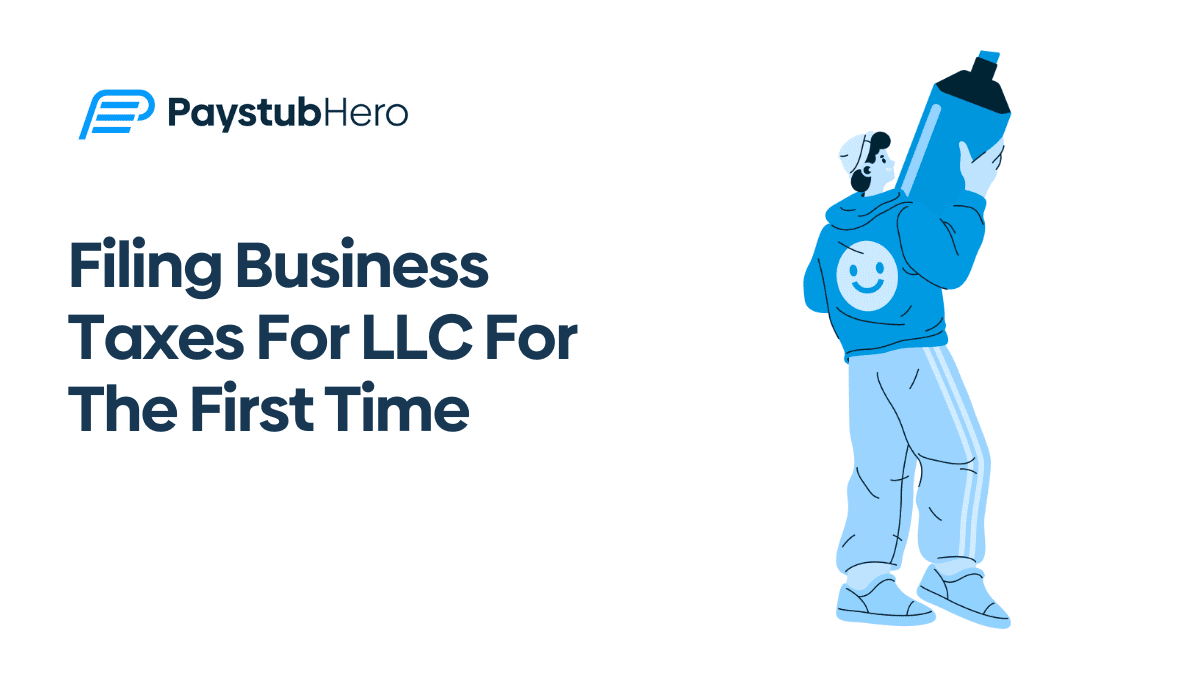In today’s fast-paced, digitized world, acquiring a loan can seem like a complex maze to navigate. From understanding the myriad of terms and conditions to interpreting interest rates, the process can be daunting.
At the core of this challenge lies the need for a clear, verifiable proof of income – the pay stub.
Pay stubs play a critical role in the financial world. They serve as a reliable indication of an individual’s earnings, a factor that financial institutions consider significantly when assessing loan eligibility. This crucial role makes pay stubs a topic of considerable interest and, unfortunately, potential misuse.
One instance of misuse that has been raising concerns in the lending industry is the utilization of “fake pay stubs for loan“.
So, what exactly does the term “fake pay stubs for loan” mean?
In simple terms, it refers to a doctored or fabricated pay stub. Such a document is altered to misrepresent an individual’s earnings, often inflating them to convince lenders that the loan applicant has a higher income than they do.
Now, it is essential to address this question straightforwardly: Is it permissible or advisable to use fake pay stubs to secure a loan?
The answer is a resounding no. Using fake pay stubs to acquire a loan is not just unethical; it is outright illegal. The act carries heavy penalties, including potentially severe legal consequences.
Through this article, we aim to delve into the implications of using fake pay stubs for loans, explain why it’s a risky and ill-advised practice, and offer alternatives to ensure you stay on the right side of the law while accurately representing your income.
Table of Contents
- Introduction
- What is a Fake Pay Stub? And Why Is It Problematic?
- The Attraction of Fake Pay Stubs for Car Loans and Other Borrowing: Understanding the Drawbacks
- Jail Time for Fake Pay Stubs for Car Loans and Other Penalties: Grasping the Legal Repercussions
- Pay Stubs, Legitimate and Easy with 123 Paystub: A Better Way Forward
- Conclusion: Always Choose Authenticity – The Key to Sustainable Financial Health
What is a Fake Pay Stub? And Why Is It Problematic?
In order to understand the severity of using a fake pay stub, it’s necessary first to comprehend what a legitimate pay stub looks like.
A pay stub, also known as a pay slip or paycheck stub, is a vital document provided by employers to their employees. It serves as a proof of income, detailing earnings, deductions, and net pay over a particular pay period.
This document is instrumental for both the employee and the employer, helping to keep track of wages, taxes, and other crucial financial information.
On the other hand, a ‘fake’ pay stub is an altered or fabricated version of this document. Fake pay stubs are often doctored to inflate income or modify employment history. The information they contain is fraudulent and created with the intent to deceive.
But why would someone resort to creating a fake pay stub? The reasons can be multifaceted.
For some, it might be an attempt to secure a loan or a rental agreement that would otherwise be out of reach based on their actual income.
For others, it might be a misguided effort to hide financial issues or to present a more financially secure picture than the reality.
However, regardless of the reason, using a fake pay stub is illegal and carries serious ramifications. It is a form of fraud, a criminal act that financial institutions, landlords, and even courts take very seriously. The consequences range from rejection of loan or rental applications to substantial fines and even jail time.
Understanding what constitutes a fake pay stub is the first step to ensuring you don’t unintentionally find yourself on the wrong side of the law. It’s crucial to use legitimate, accurate documentation when providing proof of income, a subject we’ll explore further in the sections to follow.
The Attraction of Fake Pay Stubs for Car Loans and Other Borrowing: Understanding the Drawbacks
In today’s financial landscape, the pressure to meet certain income thresholds can be significant. Whether it’s qualifying for a mortgage, securing a car loan, or simply getting approval for a credit card, there is often a minimum income requirement involved.
In some instances, these requirements might appear to be within reach but are just slightly out of grasp, leading to temptation. It’s within this context that the notion of using fake pay stubs for car loans and other borrowing options can seem like an attractive, albeit misguided, solution.
On the surface, it’s understandable why some might be tempted. For those with lower incomes or inconsistent earning patterns, such as freelancers or self-employed individuals, the appeal lies in the prospect of securing a loan that would otherwise be inaccessible.
By artificially inflating their income on a pay stub, they may believe they can satisfy the lender’s requirements and achieve their financial goals.
However, this short-term view overlooks the serious, long-term consequences. For one, it’s important to remember that lenders determine income thresholds and other loan eligibility criteria based on a careful evaluation of risk.
If an individual’s income is artificially inflated to secure a loan, there’s a high chance they may struggle to meet the repayment obligations, leading to financial distress and potential bankruptcy.
In addition, the act of submitting fake pay stubs for car loans or other credit services is fraudulent. It involves a deliberate intention to deceive, which is a criminal act. The resulting legal repercussions can be severe, ranging from hefty fines to potential jail time.
In the next section, we’ll delve deeper into the legal implications of using fake pay stubs, further emphasizing the gravity of this illicit action. It’s essential to bear in mind that what might seem like a quick fix to a temporary problem can result in severe, long-lasting consequences.
It’s always best to be transparent, truthful, and responsible when dealing with financial matters, no matter how enticing shortcuts might seem.
Jail Time for Fake Pay Stubs for Car Loans and Other Penalties: Grasping the Legal Repercussions
In the sphere of lending, trust is paramount. Financial institutions rely on accurate and honest information from loan applicants to make sound lending decisions. When this trust is breached through practices such as the use of fake pay stubs for car loans, the law steps in.
The creation and use of fraudulent documents, including fake pay stubs, is a criminal offense. Each jurisdiction has its own set of laws and penalties, but common consequences include fines, probation, and even jail time.
The severity of the punishment often correlates with the amount of money involved and the perpetrator’s intent.
For instance, someone who uses a fake pay stub to deceive a lender into providing a large car loan could face more severe penalties than someone who does the same for a smaller personal loan.
Nevertheless, no matter the amount involved, the law is clear – fraudulent activities like these are illegal and punishable.
Beyond the legal implications, the misuse of pay stubs can have far-reaching financial repercussions. Getting caught using a fake pay stub can result in immediate loan denial and a negative mark on your credit report. This can make it incredibly challenging to secure loans or credit in the future. Financial institutions share information about fraud, so one bad decision can have a ripple effect across your financial life.
Moreover, the personal and emotional consequences should not be underestimated. The stress associated with legal proceedings, potential loss of liberty, and the damage to personal reputation can be devastating.
It’s not uncommon for those involved in such fraudulent activities to suffer from stress-related health issues, not to mention the strain on personal relationships.
The long and short of it is, the penalties for using fake pay stubs for loans, whether for cars or other borrowing, are severe. The risks far outweigh the potential short-term gains, making it a dangerous and unwise course of action. Understanding these risks is crucial to making informed, ethical decisions when applying for loans.
Pay Stubs, Legitimate and Easy with 123 Paystub: A Better Way Forward
While we’ve discussed the dangers and potential pitfalls of using fake pay stubs, it’s equally important to highlight the legitimate alternatives available.
For entrepreneurs, freelancers, and small businesses, services like 123 Paystub represent a lawful, simple, and efficient solution to meet their pay stub needs.
Understanding the importance of pay stubs and their role in various financial transactions is fundamental. When you’re self-employed or run a small business, managing your income documentation can be a challenge.
Traditional payroll software is often geared towards larger companies and can be prohibitively expensive or overly complicated for smaller enterprises or independent contractors. This is where 123 Paystub steps in.
With an aim to bridge this gap and simplify payroll management, 123 Paystub offers an easy-to-use, affordable solution. This service allows users to generate accurate, legitimate pay stubs that reflect their true income, all within a few simple steps.
There’s no need to have expertise in payroll processing or invest in expensive software.
By providing an authentic, user-friendly, and cost-effective alternative to corporate-level payroll software, 123 Paystub ensures that you have the necessary documentation to present to lenders, landlords, or anyone else who requires proof of your income.
More importantly, it enables you to avoid the potential pitfalls of falling into the trap of using fake pay stubs, protecting you from legal and financial repercussions.
Embracing services like 123 Paystub is a proactive step towards responsible financial management. It not only safeguards you from inadvertently stepping into the murky waters of financial fraud but also contributes to creating a trustworthy financial profile.
And as we’ve stressed throughout this article, trust is the cornerstone of any financial transaction, be it securing a loan, renting a property, or simply maintaining transparent financial records.
Hence, when it comes to generating pay stubs, the key is to stay honest, be accurate, and use reliable services like 123 Paystub.
In the long run, this approach will help you maintain your financial integrity, protect your legal standing, and foster trust with financial institutions and other entities that rely on your financial documentation.
Conclusion: Always Choose Authenticity – The Key to Sustainable Financial Health
Navigating the world of loans and financial services can often seem like traversing a labyrinth. It’s a realm filled with jargon, complex calculations, and intricate procedures.
In the midst of these challenges, providing an accurate proof of income — in the form of pay stubs — often stands as a daunting hurdle for many, especially for those in non-traditional work arrangements.
However, it’s of utmost importance to remember that taking shortcuts, like using fake pay stubs for loans, is not just unwise, but also illegal. Not only does it jeopardize your financial future, but it also puts you at risk of severe legal repercussions.
It’s understandable that the path of authenticity might seem tough at times, especially when you’re striving to secure a loan or achieve a significant financial milestone. But remember that maintaining authenticity is not just about abiding by the law. It’s about establishing long-term financial health, fostering trust, and building strong relationships with financial institutions.
By providing accurate and honest information, you’re not only respecting the law and the lenders, but also respecting your financial journey and future.
Moreover, consider that by choosing authenticity, you’re also choosing peace of mind. You’re avoiding potential legal complications, and you’re building a financial profile that will serve you well in the long run.
Most importantly, you’re acting responsibly, not just as a borrower, but as an integral part of the larger financial ecosystem.
So, when it comes to pay stubs, always choose authenticity. Use legitimate methods to generate and provide this critical piece of documentation.
If you’re a freelancer, entrepreneur, or small business, solutions like 123 Paystub and Paystubhero are readily available to support you. They’re designed to offer an easy, legitimate, and affordable alternative to meet your pay stub needs.
In the end, choosing authenticity isn’t just about doing what’s right — it’s about doing what’s best for your financial health, reputation, and peace of mind.
This is a choice that will always stand you in good stead and pave the way for a bright, secure financial future.
Call To Action
Are you an entrepreneur, freelancer, or small business owner in need of a trusted, affordable, and easy-to-use payroll solution?
Look no further than Paystubhero. Our service is specifically designed to suit your needs, providing an easy 1-2-3 process to generate your documents quickly and efficiently.
Simply enter your company or employee information, and let our software handle the calculations. Say goodbye to the complexities of payroll and hello to simplicity with Paystubhero. Visit our website to start your journey towards hassle-free payroll management today.
Frequent Asked Questions
- Can you use fake pay stubs to get a personal loan?
- No, using fake pay stubs to obtain a personal loan is illegal and can lead to serious legal consequences, including fines and possible jail time.
- How do lenders verify pay stubs?
- Lenders often verify pay stubs by contacting the employer directly or using a third-party verification service. They may also cross-check the information with the borrower’s bank statements.
- Do loan companies verify check stubs?
- Yes, loan companies typically verify check stubs as part of their income verification process to assess a borrower’s ability to repay the loan.
- Do fake pay stubs work for car loans?
- While some may try to use fake pay stubs for car loans, this practice is illegal and highly risky. Lenders have mechanisms to detect such fraud, and using fake documents can lead to legal repercussions and loan denial.








